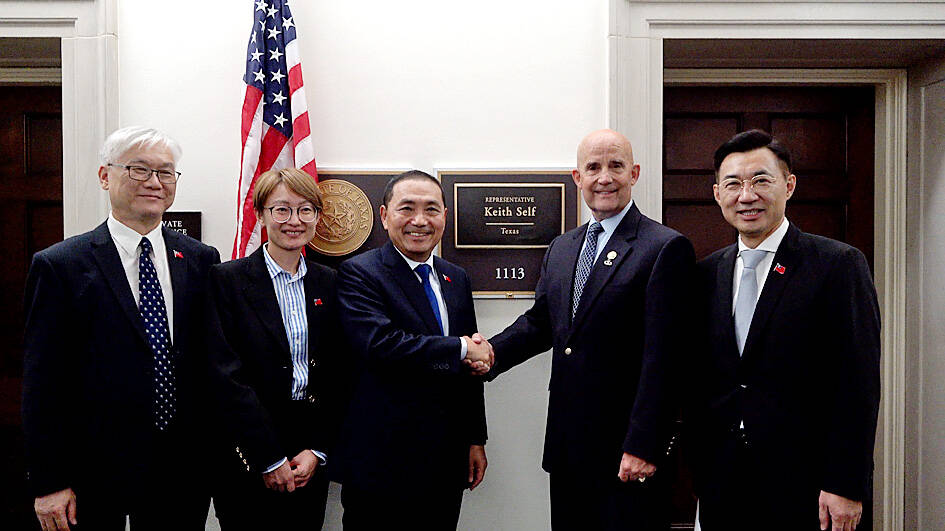New Taipei City Mayor Hou You-yi (侯友宜), the Chinese Nationalist Party’s (KMT) presidential candidate, on Monday outlined his so-called “3Ds strategy” to promote peace and stability across the Taiwan Strait during a meeting with US academics at the Brookings Institution in Washington.
The 3Ds refer to “deterrence, dialogue and de-escalation.
The hour-long closed-door meeting was not open to the press, but Hou published an English-language article titled “Taiwan’s Path Between Extremes: the Kuomintang Presidential Candidate Lays Out a Plan to Avert War With China,” the same day in the Foreign Affairs magazine.

Photo: CNA
Taiwan has to be prepared for war, but use its strength to safeguard peace and stability across the Strait, Hou said in the article.
However, at the same time, he advocates the re-establishment of dialogue with China per the Constitution of the Republic of China, as well as the Act Governing Relations Between the People of the Taiwan Area and the Mainland Area (臺灣地區與大陸地區人民關係條例), which provides a legal framework for cross-strait relations.
“Drawing from successful experiences with such dialogue during past KMT governments, such as the collaborative efforts to combat crime since the 1990s that culminated in a comprehensive agreement on judicial mutual assistance signed in 2009, I will continue cross-strait communication while avoiding military miscalculations,” he wrote.
Hou said that such cross-strait dialogue must be based on the principles of equality, goodwill and dignity.
“Through mid and long-term interactions between both sides, I believe it is possible to gradually decrease hostility and reduce the risk of conflict across the Taiwan Strait and avoid the threat of war,” he wrote.
After the closed-door meeting, Richard Bush, non-resident senior fellow in the Center for East Asia Policy Studies at Brookings and a former American Institute in Taiwan (AIT) director, said that both sides had a “very detailed and substantive discussion.”
“My cohosts and I believe that people on the American side got a very good understanding of Mayor Hou’s views on cross-strait relations and US-Taiwan relations, and we’re grateful for that,” he said.
“I think that Mayor Hou heard very clearly what the interests and concerns of people on the American side were,” Bush said, without elaborating.
Following the think tank speech, Hou visited the AIT Washington headquarters and was greeted by AIT Chairwoman Laura Rosenberger. The closed-door meeting lasted an hour and Hou did not make a public statement afterward.
Sources said that Hou also met with several Republican lawmakers, including Mike Garcia, Pete Sessions and Keith Self.
Hou is on an eight-day visit to the US that began in New York.
Yesterday was Hou’s last day in Washington before he heads to San Francisco and returns to Taipei.
It has been a longstanding practice for Taiwanese presidential candidates to visit the US before elections.
Taiwan People’s Party Chairman and presidential candidate Ko Wen-je (柯文哲) and Vice President William Lai (賴清德), the Democratic Progressive Party’s presidential nominee, also visited the US earlier this year.

Eight restaurants in Taiwan yesterday secured a one-star rating from the Michelin Guide Taiwan for the first time, while three one-star restaurants from last year’s edition were promoted to two stars. Forty-three restaurants were awarded one star this year, including 34 in Taipei, five in Taichung and four in Kaohsiung. Hosu (好嶼), Chuan Ya (川雅), Sushi Kajin (鮨嘉仁), aMaze (心宴), La Vie by Thomas Buhner, Yuan Yi (元一) and Frassi in Taipei and Front House (方蒔) in Kaohsiung received a one-star rating for the first time. Hosu is known for innovative Taiwanese dishes, while Chuan Ya serves Sichuan cuisine and aMaze specializes

Taitung County is to launch charter flights to Malaysia at the end of this year, after setting up flights to Vietnam and Thailand, the Taitung County Government said yesterday. The new charter flight services, provided by low-cost carrier Batik Air Malaysia, would be part of five-day tour packages for visits to Taitung County or Malaysia. The Batik Air charter flight, with about 200 seats, would take Malaysian tourists to Taitung on Dec. 30 and then at 12:35pm return to Kuala Lumpur with Taiwanese tourists. Another charter flight would bring the Taiwanese home on Jan. 3 next year, arriving at 5:30pm, before taking the

Taiwan High Speed Rail Corp. (THSRC) plans to ease strained capacity during peak hours by introducing new fare rules restricting passengers traveling without reserved seats in 2026, company Chairman Shih Che (史哲) said Wednesday. THSRC needs to tackle its capacity issue because there have been several occasions where passengers holding tickets with reserved seats did not make it onto their train in stations packed with individuals traveling without a reserved seat, Shih told reporters in a joint interview in Taipei. Non-reserved seats allow travelers maximum flexibility, but it has led to issues relating to quality of service and safety concerns, especially during

STATS: Taiwan’s average life expectancy of 80.77 years was lower than that of Japan, Singapore and South Korea, but higher than in China, Malaysia and Indonesia Taiwan’s average life expectancy last year increased to 80.77 years, but was still not back to its pre-COVID-19 pandemic peak of 81.32 years in 2020, the Ministry of the Interior said yesterday. The average life expectancy last year increased the 0.54 years from 2023, the ministry said in a statement. For men and women, the average life expectancy last year was 77.42 years and 84.30 years respectively, up 0.48 years and 0.56 years from the previous year. Taiwan’s average life expectancy peaked at 81.32 years in 2020, as the nation was relatively unaffected by the pandemic that year. The metric